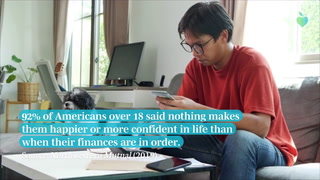What Is Financial Wellness?
Setting and meeting financial expectations can improve your general well-being.


What is financial well-being, other than the absence of money-related stress? How is it related to overall wellness? And how do you know when you have achieved it?
According to Everyday Health’s United States of Stress survey, finances are the most common source of stress among men and women. Managing that stress can have real benefits for a person’s health.
Many U.S. companies realize that personal finances and health are often closely linked. Nine out of 10 large and mid-sized companies now offer financial wellness programs, and another 10 percent are considering adding them, according to a press release published in May 2018 by the National Business Group on Health (NBGH). Employers believe these programs can boost employees’ productivity, engagement, and health.
5 Ways Making A Budget Can Be Good For Your Health

Financial Well-Being as Security
Financial well-being enables people to better enjoy life in general, says Nancy Molitor, PhD, clinical assistant professor of psychiatry and behavioral sciences at Northwestern University’s Feinberg School of Medicine in Evanston, Illinois. “When people are in that state, they are more able to live in the moment and enjoy the little everyday pleasures of life: seeing your kids do well and be happy, having friendships, good relationships, being able to go out, travel, whatever.”
RELATED: Financial Stress and Wellness — Understanding the Problem
LuAnn Heinen, vice president at the National Business Group on Health, says financial security is one of five elements of well-being that employers can impact. (The others are physical health, emotional well-being, social connectedness, and job or career satisfaction.)
Heinen defines financial security as “the perception that you have enough money to do what you want to do, and you don't routinely worry about money.” That sense of security, she adds, “contributes greatly” to general well-being.
Financial Well-Being as a Continuum
In a January 2015 report on the goal of financial education, the federal Consumer Financial Protection Bureau (CFPB) defines financial well-being in practical terms. They say it means having control over day-to-day finances, being able to absorb a financial shock, being on track toward financial goals, and having the freedom to make choices that help you enjoy life.
According to the CFPB report, “financial well-being describes a continuum — ranging from severe financial stress to being highly satisfied with one’s financial situation — not strictly aligned with income level.” That’s because some people may feel that they have achieved a high level of financial well-being even if they are not affluent, while others with higher incomes may not be satisfied with their level of financial well-being.
The report adds that “through learning and effort, and given reasonable opportunity and supports, it appears that people can move along the continuum to greater financial well-being.”
Financial Well-Being as Freedom
In another report, professional services firm PwC asked 1,600 U.S. adults working full-time how they defined financial well-being. For the vast majority of respondents, it came down to freedom.
According to the 2018 Employee Financial Wellness Survey results, 21 percent of the employees said it meant freedom from financial stress, another 21 percent pointed to freedom from worry about unexpected expenses, yet another 21 percent cited freedom from debt, and 18 percent described financial well-being as freedom to make choices.
Benchmarks Can Raise Stress
Financial experts often use general benchmarks to set standards for financial wellness. They may cite the rule of thumb that it is financially healthy to have enough money in emergency savings to cover three to six months of expenses, for example.
There are also formulas for calculating how much is enough to save for retirement — savings that will last a certain number of years, or retirement accounts large enough to throw off a certain level of income.
But if you are feeling financial stress, targets like these can be more intimidating than helpful. When your goals are overly ambitious, “you begin to believe that the only way you’ll ever get where you want to be is by winning the lottery,” wrote author J.D. Roth, founder of the personal finance website and course Get Rich Slowly, in an article on his website.
Dr. Molitor agrees. “When you get scared, you get more anxious, and that affects your physical and emotional health,” she says. “You aren’t going to do any better, and you may do worse, at managing your money.”
How Much Is Enough?
One way to bring down the fear factor is to remember that you don’t have to be wealthy to achieve financial well-being.
According to previous research, beyond a modest point, more money has only a limited effect on our happiness. Once we have satisfied our basic needs, we are able to quickly get used to what increased wealth can do for us. Our new financial status starts to feel ordinary — or even inadequate.
RELATED: How Do You Achieve Financial Well-Being?
Building financial resilience is also helpful, Heinen says. She points out that more employers are now helping workers find ways to build their emergency savings, deal with their student debt, and find reasonable mortgages and car loans.
Simply setting personal goals can help you progress toward well-being with your finances and more, according to Tal Ben-Shahar, PhD, a former lecturer at Harvard University in Cambridge, Massachusetts, and author of several books, including Being Happy.
“Goals communicate, to ourselves and others, the belief that we are capable of overcoming obstacles,” he wrote. When we commit to that belief, “we demonstrate faith in ourselves.”
These moves won’t transform your financial life overnight. But when you engage with your finances and commit to healthy changes, chances are you will start feeling better before you know it.
Kelley Holland is a professional speaker and personal finance coach who helps people lose their fear of personal finance and take charge of their money. Her company, Own Your Destiny, offers coaching services and financial workshops.
